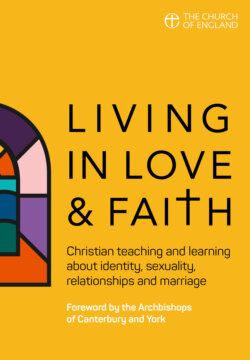Читать книгу Living in Love and Faith - Bishops of the Church of England - Страница 29
На сайте Литреса книга снята с продажи.
Meet some people at ALL HALLOW’S CHURCH
ОглавлениеI was met at the railway station by Mary. We struck up a lively conversation about mutual Africa interests: Mary has been a Church Mission Society mission partner for decades. The vicar welcomed us into the vicarage, where we found the others already ensconced in the comfortable sofas ready for our conversation. The vicar wished us well and left the room.
The conversation begins with Scripture. ‘Everything that happens in life falls under Scripture,’ says Clare. Mary refers us to a recent sermon series which included titles such as ‘Who am I?’ ‘Is gender fluid?’ ‘Who can I marry?’ ‘Is following Jesus good news for the LGBTI+ community?’ and talks about how the sermons were ‘done with such love. We’re all sinners in need of the love of Jesus and the transforming work of the Holy Spirit.’
‘We’re all sinners in need of the love of Jesus and the transforming work of the Holy Spirit.’
But the conversation quickly moves on to what genuine welcome means in practice. Everyone is eager to express their deep desire for people to feel truly welcomed. ‘Please come and talk to us; let us know what it’s like to be you. We want you to be here.’ ‘That doesn’t of course, compromise what we believe the Bible says,’ notes Amy. ‘And actually, I think those two things are held together really well. The Bible wants us to speak the truth as God’s given it to us in his word. But we must do it in a genuinely loving way; we are going to put action behind those words and really seek to help you in whatever struggle it is that you have.’ ‘The point is no one is good enough. And that’s why we are all here.’
Samuel verbalises a concern about how welcome is perceived not as ‘how friendly and polite and welcoming and warm we are to people, but whether or not we accept their lifestyle choices.’ That doesn’t, of course, mean demanding a change in lifestyle choices as a condition of welcome. But it might mean being challenged at some point – and challenge is never comfortable for anyone.
Samuel reminds them that this isn’t easy. ‘It’s been helpful for us as a church just to be clear that, in saying we wouldn’t promote or celebrate same-sex marriages or gender transitions, we are doing that out of love for people, out of a genuine desire to see them flourish. Because it’s really easily misinterpreted as bigotry, and not without some foundation, because lots of churches are quite unwelcoming.’
Mary puts the conversation within the context of her own experience as a single woman. ‘And if we really care, as a people of God, here in this community, we don’t want them to carry on feeling that being free to define ourselves as we want is the way ahead. That’s building your life on sand. I’ve been single all my life, and sometimes that’s a struggle. The world says, “Go and have fun. Have any relationships you like.” No, if I’m single, I’m celibate for the Lord. And that’s where my identity is [in Christ], and that’s who I am, and I’m totally at peace and content with that situation.’
Nigel identified the church’s tendency to put married family life on a pedestal, which means single people or married couples without children are easily diminished. Both ways of life are gifts to be celebrated, he says. All of this, he reflects, points to the uncomfortableness of too easily talking about them and us in relation to LGBTI+ people. Everyone is included in ‘them’ and ‘us’. ‘Perhaps some of my discomfort,’ says Nigel, ‘is that we’re making the LGBTI+ issue special […] which troubles me.’
The discussion concluded on one more area that the group agreed the church could improve on: prayer – both ‘prayer that we would be welcoming to people, but also prayers for the issues in the Church of England surrounding it.’
